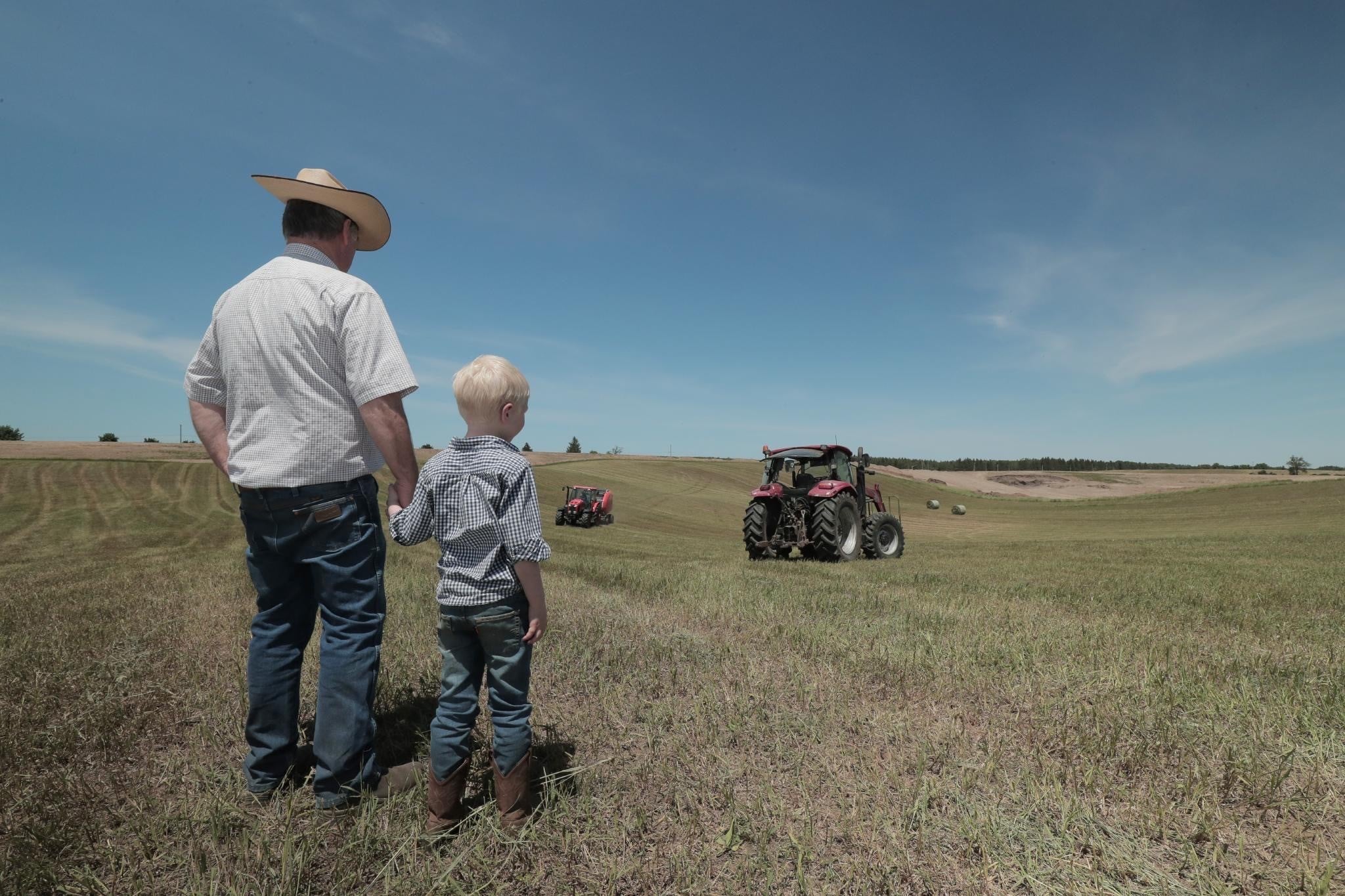Succession planning has become a pretty sexy topic in agriculture. Every hip and trendy professional office for farmers is mailing out their own shiny leaflet to everyone they know about it, and no self-respecting event planner would even think of hosting an agricultural conference without at least one workshop on transferring the farm to the next generation.
But hold the champagne, because farmers still aren’t buying it.
The workshops may be full, but the work itself isn’t moving off the “someday” list.
Debra Hauer of the Canadian Agricultural Human Resources Council helped create a Human Resources Tool Kit just last year which included, of course, a succession module. “Succession planning has been a hot topic for a while across the country, and there are a number of good resources,” Hauer says, and she begins to tick off the fact sheets contributed by various provincial governments and producer associations.
Read Also

Where convention and innovation meet
How one Ontario farm is integrating technology into their beef operation.
Most of those fact sheets and resources focus on the traditional understanding of succession planning, i.e. the intergenerational transfer of a business. But Hauer’s kit also addresses the less familiar definition of succession planning, where an employer creates a plan to ensure there will be replacements ready to step in for all key positions.
“Succession planning is a part of the general HR function… to make sure that the people are in place to ensure success,” Hauer explains.
Hauer tells me the kit has been well received, especially by farmers whose businesses are really growing, so they will have the right managers and the right skill sets in place as their business continues to get larger and more complex.
In fact, a number of organizations have bulk purchased the tool kit too, and one university has even deemed it a required text for students. “In the summer and fall last year, I contacted people who had purchased the tool kit and the feedback was excellent,” Hauer says.
But when I ask her what farmers specifically said about the succession section of the kit, she pauses and then responds, “Quite honestly, there have been no comments about the succession section.”
It isn’t an isolated case. When you look beyond the workshop attendance numbers and the book sales figures, and when you try to find actual evidence that farmers are implementing enough succession plans to match the scale of impending succession squeeze, the numbers just don’t add up.
When it comes to planning for the future of the farm, it seems, the agricultural industry could use a little less talk and a lot more action.
This isn’t unique to the farm community. A Canadian Federation of Independent Business (CFIB) study conducted in 2012 found that over half of all small and medium enterprise owners in Canada had no plan at all for what will happen to their business when they’re done with it. Only nine per cent of businesses had a formal succession plan.
To get a sense of how farmers compare, just one year earlier, Ipsos Forward Research found 19 per cent of a sample of farmers from Ontario did have formal succession plans.
Daphne McGuffin, who creates succession programs for both farm and non-farm families at BDO SuccessCare, agrees that farmers are usually better at initiating succession than the average business owner.
- More “succession” with Country Guide: Set your family up for success
“Farm families, generally speaking, do a better job because it’s their legacy,” McGuffin says. When she recalls all the studies she’s been reading in recent years, she says the basic summary is that 80 per cent of all business owners would like to see their business stay in the family but 50 per cent don’t expect that to actually happen. “The sad thing about that,” she says, “is they’re making the decision without really trying.”
McGuffin remembers that when she was first getting started in the succession business, back in 1996, there was little awareness at any level about succession planning, and she believes business owners had reasonable excuses for poor planning then.
A 1999 report by Deloitte & Touche after all was the very first to offer insights into small business succession in Canada. Their questionnaire revealed that 43 per cent of Canadian business owners didn’t even believe it was important to keep a business in the family. As well, 70 per cent had not yet selected a successor and 66 per cent of respondents had no process for selecting one, although 56 per cent planned to retire within 10 years and another 22 per cent within 15 years.
Farmers might therefore be doing better than some other sectors. But are they still doing too little?
A team of English and American researchers published data in the August 2010 Journal of Agriculture, Food Systems, and Community Development comparing farmers’ relative expertise in succession planning globally, and its 1997 survey of Ontario and Quebec indicated that roughly 40 per cent of farmers had already identified a successor at that time.
Yes, that’s right, about 40 per cent had identified a successor already in 1997 and 15 years later, just 19 per cent of farmers had written a succession plan. McGuffin says two CFIB surveys, administered first in 2005 and then repeated in 2012, establish even more disturbing trends.
“Back in 2005, 60 per cent of business owners said ‘it’s too early’ to start their succession plan,” she tells me. “In 2012, the response only went down to 52 per cent.”
McGuffin continues on to the next excuse, i.e. “no time to deal with the issue.” Back in 2005, 28 per cent gave that as an answer. In 2012, it was 29 per cent.
As an excuse, “Can’t find adequate advice and tools to start,” becomes even more suspicious since 17 per cent listed it in 2005, growing to 21 per cent in 2012 despite all the work that governments, farm organizations and advisory firms have put into the issue.
Other responses which increased included “the process was too complex,” plus the number of farmers who simply didn’t want to think about leaving (up from eight per cent to 13 per cent).
With numbers like that, McGuffin believes there is a real problem in the succession-planning field.
The fault doesn’t only belong to farmers. “I don’t think advisers are addressing three fears that business owners have,” McGuffin says. “One is the fear of loss of wealth, the second is a loss of control or identity, and the third is fear of conflict.”
Recently, loss of wealth has been more of a concern for other businesses impacted by the economic downturn, but farmers are hardly immune to exterior factors. The fact that a third of business owners with succession plans had to revise their existing succession plans, delaying or accelerating their exit date according to CFIB, supports McGuffin’s point that succession planners need to do a better job of incorporating contingency strategies for market fluctuations.
Meanwhile, the No. 1 reason for lack of farm progress is farmers’ fear of losing their identity.
Yet experience shows that such fears can be swiftly mitigated by post-transition-planning exercises that identify exciting opportunities for the exiting generation, McGuffin says.
Fear of conflict is more stubborn, yet it can be managed too. “Choosing a successor means you’re saying no to somebody else,” McGuffin agrees. “When it’s your kid, that’s pretty hard to do.”
In order to help farmers overcome these hurdles, McGuffin says BDO SuccessCare teamed up with the Agricultural Management Institute (AMI) to produce interactive resources that will be harder for farmers to leave unopened on a shelf. One of their most comprehensive resources, the Choose your own Succession online tutorial, is best described by Ryan Koeslag, AMI’s executive director, as a quick and dirty succession tool.
“Really what we’re trying to encourage is taking it to your adviser,” says Koeslag, “but we were worried there are a number of accountants or succession-planning consultants that know one process and one process only.”
Koeslag says they don’t want to encourage farmers to eliminate professionals from their succession planning efforts because AMI baseline research has found that farmers get greater satisfaction from outside succession training than from any other strategy.
While there is no clear confirmation that farmers are following through with their advisers, the interactive nature of the resource does provide immediate feedback on user behaviour.
“We know it’s had a lot of really good hits,” Koeslag tells me. “Even prior to launching the program, promotions within BDO and just word of mouth generated over 400 hits, which was phenomenal.”
As a farmer involved in two operations himself, Koeslag knows first hand how difficult it can be to get that plan written on paper. But AMI’s research also shows that, of farmers retiring in the next five to 10 years, 67 per cent believe succession planning is a valuable practice.
Exactly how valuable was established by Pricewaterhouse Coopers last year. Companies that transition without a succession plan experience a 29 to 32 per cent drop in business in the first three years post-transfer.
In other words, if all the farmers who say they want to develop a succession plan actually got around to getting the job done, the income hit on agriculture would likely be slashed by billions.
Koeslag isn’t holding his breath.
“For the most part, succession planning is the most supplied resource, but a fairly small percentage of the industry — too small from our perspective — seriously engage themselves in it in a constructive way,” Koeslag says. “We want that succession conversation to start from Day 1.”
This article was originally published as, “Succession Shock,” in the September 2014 edition of Country Guide in a special section entitled, Succession in Agriculture.
















